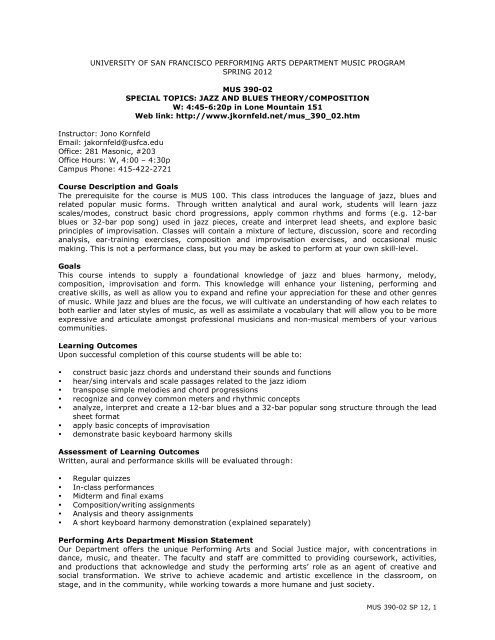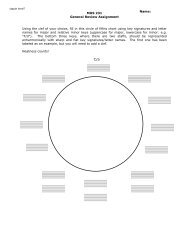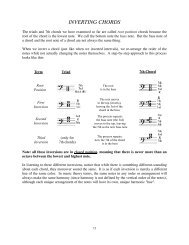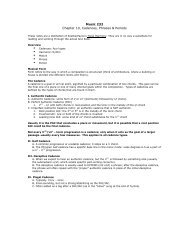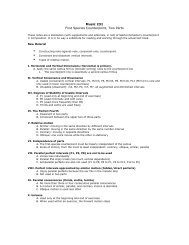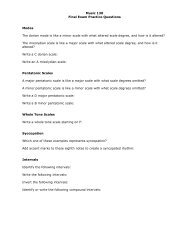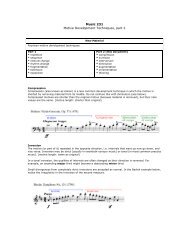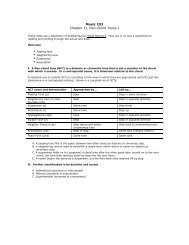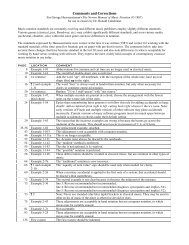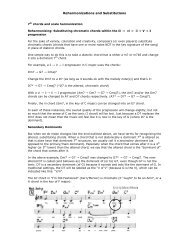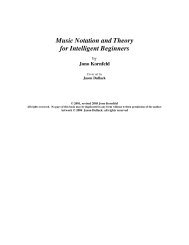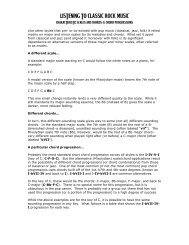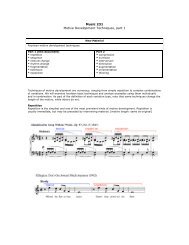Printable version of this syllabus - Jkornfeld.net
Printable version of this syllabus - Jkornfeld.net
Printable version of this syllabus - Jkornfeld.net
Create successful ePaper yourself
Turn your PDF publications into a flip-book with our unique Google optimized e-Paper software.
UNIVERSITY OF SAN FRANCISCO PERFORMING ARTS DEPARTMENT MUSIC PROGRAM<br />
SPRING 2012<br />
Instructor: Jono Kornfeld<br />
Email: jakornfeld@usfca.edu<br />
Office: 281 Masonic, #203<br />
Office Hours: W, 4:00 – 4:30p<br />
Campus Phone: 415-422-2721<br />
MUS 390-02<br />
SPECIAL TOPICS: JAZZ AND BLUES THEORY/COMPOSITION<br />
W: 4:45-6:20p in Lone Mountain 151<br />
Web link: http://www.jkornfeld.<strong>net</strong>/mus_390_02.htm<br />
Course Description and Goals<br />
The prerequisite for the course is MUS 100. This class introduces the language <strong>of</strong> jazz, blues and<br />
related popular music forms. Through written analytical and aural work, students will learn jazz<br />
scales/modes, construct basic chord progressions, apply common rhythms and forms (e.g. 12-bar<br />
blues or 32-bar pop song) used in jazz pieces, create and interpret lead sheets, and explore basic<br />
principles <strong>of</strong> improvisation. Classes will contain a mixture <strong>of</strong> lecture, discussion, score and recording<br />
analysis, ear-training exercises, composition and improvisation exercises, and occasional music<br />
making. This is not a performance class, but you may be asked to perform at your own skill-level.<br />
Goals<br />
This course intends to supply a foundational knowledge <strong>of</strong> jazz and blues harmony, melody,<br />
composition, improvisation and form. This knowledge will enhance your listening, performing and<br />
creative skills, as well as allow you to expand and refine your appreciation for these and other genres<br />
<strong>of</strong> music. While jazz and blues are the focus, we will cultivate an understanding <strong>of</strong> how each relates to<br />
both earlier and later styles <strong>of</strong> music, as well as assimilate a vocabulary that will allow you to be more<br />
expressive and articulate amongst pr<strong>of</strong>essional musicians and non-musical members <strong>of</strong> your various<br />
communities.<br />
Learning Outcomes<br />
Upon successful completion <strong>of</strong> <strong>this</strong> course students will be able to:<br />
• construct basic jazz chords and understand their sounds and functions<br />
• hear/sing intervals and scale passages related to the jazz idiom<br />
• transpose simple melodies and chord progressions<br />
• recognize and convey common meters and rhythmic concepts<br />
• analyze, interpret and create a 12-bar blues and a 32-bar popular song structure through the lead<br />
sheet format<br />
• apply basic concepts <strong>of</strong> improvisation<br />
• demonstrate basic keyboard harmony skills<br />
Assessment <strong>of</strong> Learning Outcomes<br />
Written, aural and performance skills will be evaluated through:<br />
• Regular quizzes<br />
• In-class performances<br />
• Midterm and final exams<br />
• Composition/writing assignments<br />
• Analysis and theory assignments<br />
• A short keyboard harmony demonstration (explained separately)<br />
Performing Arts Department Mission Statement<br />
Our Department <strong>of</strong>fers the unique Performing Arts and Social Justice major, with concentrations in<br />
dance, music, and theater. The faculty and staff are committed to providing coursework, activities,<br />
and productions that acknowledge and study the performing arts’ role as an agent <strong>of</strong> creative and<br />
social transformation. We strive to achieve academic and artistic excellence in the classroom, on<br />
stage, and in the community, while working towards a more humane and just society.<br />
MUS 390-02 SP 12, 1
Book<br />
The New Real Book, Volume 1: C and Vocal Version (Sher Music Co., 1988) ISBN 0-9614701-4-3<br />
Materials<br />
• Manuscript/staff paper (without left-side bar lines–<strong>this</strong> can be downloaded for free if you do not<br />
want to buy a notebooks’ worth)<br />
• Pencils and eraser<br />
• Access to a keyboard or (preferably) piano<br />
• Inter<strong>net</strong> access for downloading instructional materials and audio examples<br />
Class Participation and Conduct<br />
• Class participation (in discussions, aural, performance and improvisation exercises, and written<br />
work) is mandatory and factors into your final grade. It is crucial to your learning process and will<br />
make your experience in the class more meaningful.<br />
• You are expected to have completed all reading, written, listening and performance-preparation<br />
work prior to each class meeting. You are also expected to bring all course materials and book(s)<br />
to each class meeting. This is crucial in you getting the most out <strong>of</strong> each class.<br />
• You are expected to play an active role in creating and maintaining a supportive, friendly and<br />
respectful class environment.<br />
• Studying music is like studying a language: learning rates can vary from student to student, but<br />
the best results come from consistent engagement with the material on a day-to-day basis. Two<br />
hour’s worth <strong>of</strong> studying/practicing in one day will not be as good as 30 minutes’ worth over four<br />
consecutive days. It can also be very helpful to partner up with classmates when it comes to<br />
preparing for performances <strong>of</strong> any type—music-making is <strong>of</strong>ten a social experience and can be<br />
practiced as such.<br />
• All written work (homework, compositions, quizzes, exams) must be done in pencil (unless<br />
otherwise specified) and maintain a pr<strong>of</strong>essional, legible appearance.<br />
• Students are responsible for acquiring handouts and assignments that are distributed in class even<br />
in the event <strong>of</strong> an unforeseen absence.<br />
• The use <strong>of</strong> electronic devices (phones, laptops, mp3 players, etc.) is prohibited. Please remember<br />
to silence your phones when entering the classroom.<br />
• There may be instances where we need to make individual, special arrangements. In these cases,<br />
it is best that we do so in person. However, it will also be necessary to follow up such face-to-face<br />
communications with confirmation emails. In the event that we have made a special<br />
arrangement, please make sure we have at least done so in writing. If you write to me, please<br />
communicate as clearly as possible. While <strong>this</strong> is a music class, you are expected to practice<br />
college-level, pr<strong>of</strong>essional communication standards in your written and oral communication.<br />
Academic Integrity<br />
The Department <strong>of</strong> Performing Arts adheres to USF's Academic Honesty Policy outlined in the<br />
Fogcutter. Academic Dishonesty includes, but is not limited to:<br />
• Plagiarism, intentionally or unintentionally representing the words or ideas <strong>of</strong> another person as<br />
your own; failure to properly cite references; manufacturing references;<br />
• Working with another person when independent work is required;<br />
• Submission <strong>of</strong> the same paper in more than one course without the specific permission <strong>of</strong> each<br />
instructor;<br />
• Submitting a paper written by another person or obtained from the Inter<strong>net</strong>.<br />
Penalties for violation <strong>of</strong> the policy may include a failing grade on the assignment, a failing grade in<br />
the course, and/or a referral to the Dean and the Committee on Student Academic Honesty.<br />
USF's Honor Code: As a Jesuit institution committed to the care and education <strong>of</strong> the whole person,<br />
USF has an obligation to ensure that all members <strong>of</strong> the academic community embody and foster the<br />
values <strong>of</strong> honesty and integrity. All students are expected to know and adhere to the University’s<br />
Honor Code. You can find the full text <strong>of</strong> the code online at www.usfca.edu/fogcutter.<br />
MUS 390-02 SP 12, 2
Attendance<br />
Attendance will be taken at every class meeting. In accordance with the <strong>of</strong>ficial policy <strong>of</strong> the USF<br />
Department <strong>of</strong> Performing Arts, students enrolled in a 2-unit academic class may miss up to 1 class<br />
without penalty. For every absence thereafter, the student’s final grade will be lowered by one grade<br />
point, such as from a B+ to B. Tardiness to class, or leaving early without permission, will also affect<br />
your grade: Three <strong>of</strong> either (or a combination) will count as one absence. Students who miss more<br />
than 5 class meetings may be asked to withdraw from the class or risk being given a failing grade.<br />
Exception: When representing USF in intercollegiate competition (e.g., athletics, debate), students<br />
shall be excused from classes on the hours or days such competition takes them away from classes.<br />
However, such students shall be responsible for advising their pr<strong>of</strong>essors regarding anticipated<br />
absences and for arranging to complete course work for classes, laboratories and/or examinations<br />
missed.<br />
Homework<br />
All homework is due at the beginning <strong>of</strong> class on the assigned date unless otherwise specified. Late<br />
assignments will not be accepted unless there are extenuating circumstances and I am notified in<br />
advance.<br />
Redo Policy: Unless otherwise specified, you can redo any homework assignment that gets less than a<br />
93%. The score <strong>of</strong> the redone <strong>version</strong> <strong>of</strong> the assignment will be averaged with the original score for a<br />
final assignment grade, with a maximum possible grade <strong>of</strong> 93%. Redone assignments are due one<br />
class period after the original assignment is handed back. Redoing an assignment means that you<br />
either make clear corrections on the original assignment, or that you hand in a copied-over, corrected<br />
<strong>version</strong> <strong>of</strong> the original assignment on a separate piece <strong>of</strong> paper. For the latter, you MUST staple the<br />
redone assignment to the original marked-up <strong>version</strong>; you don't have to copy over portions <strong>of</strong> the<br />
original assignment that were done correctly.<br />
Grading (distribution subject to change)<br />
Attendance, participation and level <strong>of</strong> preparedness: 5%<br />
Keyboard harmony demonstration: 5% (in two parts)<br />
In-class exercises and performances: 5%<br />
Quizzes (approximately 5, with the lowest grade dropped; 2.5% each): 10%<br />
Homework (mainly short written exercises and analyses): 35%<br />
Composition projects: 10%<br />
Exams: 30%<br />
Grades on all assignments, quizzes and tests will be given as percentages; only your final course<br />
grade will be in letter form.<br />
Students with Disabilities<br />
If you have a disability for which you are or may be requesting an accommodation, you are<br />
encouraged to contact both your instructor and Student Disability Services (SDS), 422-6876 as early<br />
as possible in the semester. SDS ensures that students with disabilities have equal access to all areas<br />
<strong>of</strong> university life and receive appropriate educational support and services to foster their academic and<br />
personal success. For services related to head injury, health, hearing, mobility, physical,<br />
psychological, temporary, or vision impairments call 422-2613. For services related to Learning<br />
Disabilities, AD/HD, or Asperger’s Syndrome, call 422-6876. For more information, visit the web site<br />
at http://www.usfca.edu/acadserv/academic/services/sds/<br />
MUS 390-02 SP 12, 3
MUS 390–02<br />
APPROXIMATE CLASS/ASSIGNMENT SCHEDULE – updated 2/15/12<br />
(subject to modification)<br />
Week/Date Class Topics and Activities Assignments (written/listening)<br />
due at the start <strong>of</strong> class<br />
N.B. most reading and written<br />
assignments will be downloadable<br />
1: Jan 25 Course overview<br />
Diatonic harmony review: scales, intervals, triads,<br />
7 th chords (symbols and roman numerals),<br />
in<strong>version</strong>s, circle <strong>of</strong> 5ths/progressions<br />
2: Feb 1 Transposition, more on chord symbols, 7th<br />
chords, slash notation, basic progressions (ii V I),<br />
substituting the M6 th chord for the M7 th chord,<br />
lead sheet format<br />
3: Feb 8 More on lead sheet format<br />
Rhythm: swing, latin, bebop, ballad<br />
Expanded progressions: iii vi ii V I<br />
ii V units<br />
Seven basic 7th chords<br />
Quiz 1:<br />
* 7th/6th chord spelling <strong>of</strong> lead sheet symbols<br />
* Vocabulary<br />
4: Feb 15 Singing ii V I bass lines<br />
More on ii V units<br />
Reharmonizing: secondary dominants, tritone<br />
subs, approach chords<br />
I vi(VI*) ii(II*) V I<br />
I vi ii V iii vi ii V I<br />
I vi ii V -- iii bIII* ii bII* I<br />
Other chord functions: alterations and extensions<br />
Keyboard applications/voicings<br />
5: Feb 22 Form:<br />
12-bar blues (basic/vocal, bebop, maj/min);<br />
The dominant 7th chord in blues<br />
Quiz 2: Chord substitutions<br />
6: Feb 29 Form:<br />
32-bar song AABA; uses <strong>of</strong> cadences;<br />
Rhythm changes; other forms<br />
Review/prepare for midterm<br />
Read (suggested for reference):<br />
Triads, 7th chords, the roman numeral<br />
harmony system, in<strong>version</strong>s, basic chord<br />
progressions<br />
Assignment #1: Review assignment<br />
(distributed in class)<br />
Read:<br />
Jazz rhythms & styles;<br />
Basic chords and progressions<br />
Assignment #2:<br />
ii V I table (for all M/m keys)<br />
(complete if not finished in class)<br />
Transposing and Identifying ii V I<br />
progressions<br />
Read:<br />
Chord reharmonizations & substitutions;<br />
Chord extensions and alterations;<br />
Lead sheet format (handed out in class)<br />
Assignment #3:<br />
Lead sheet basic analysis<br />
Read:<br />
The blues form and its variations;<br />
The 32 bar (popular) form<br />
Assignment #4: Jazz standard<br />
reharmonization using substitute and<br />
approach chords<br />
Read: other forms and structures in<br />
blues/jazz<br />
Assignment #5: Form analysis<br />
MUS 390-02 SP 12, 4
7: Mar 7 Midterm exam<br />
Keyboard harmony demonstration, part I due<br />
Spring Break: March 12-16<br />
8: Mar 21 Melody construction (motif & sequence)<br />
Melodic improvisation; scales, motif, sequence,<br />
arpeggios, nonchord tones<br />
9: Mar 28 Blues improvisation<br />
32 bar form improvisation<br />
Quiz 3: Melody & nonchord tones<br />
10: Apr 4 Composition: blues<br />
11: Apr 11 Composition: 32-bar AABA jazz<br />
Quiz 4: Improvisation (& blues) scales, guide<br />
tones<br />
12: Apr 18 Modal jazz; modal blues; other forms/styles<br />
13: Apr 25 Composition presentations<br />
14: May 2 Composition presentations<br />
Quiz 5: Modes<br />
15: May 9 Review for final<br />
May 16 Final exam, 5:30 – 7:00pm, LM 151<br />
Keyboard Harmony Demonstration, part II due<br />
Grading (distribution subject to change)<br />
Attendance, participation and level <strong>of</strong> preparedness: 5%<br />
Keyboard harmony demonstration: 5% (in two parts)<br />
In-class exercises and performances: 5%<br />
Quizzes (approximately 5, with the lowest grade dropped; 2.5% each): 10%<br />
Homework (mainly short written exercises and analyses): 35%<br />
Composition projects: 10%<br />
Exams: 30%<br />
Read: melody & motif;<br />
basics <strong>of</strong> melodic improvisation<br />
Read: improvising within song formats<br />
Assignment #6: melodic<br />
analysis/synthesis<br />
Read: blues composition –<br />
chords/melody<br />
Assignment #7: improvisation motifs<br />
and sketches<br />
Read: 32-bar compositions –<br />
chords/melody/format<br />
Assignment #8: blues composition<br />
Read: modes, applied modality<br />
Assignment #9: 32-bar analysis<br />
Assignment #10: 32-bar composition<br />
Assignment #11: composition rewrites<br />
MUS 390-02 SP 12, 5


